Advocacy
"If people in poverty are not present when the laws are written, then they won’t be there when the laws are implemented.”
— Joseph Wresinski, Founder of ATD Fourth World
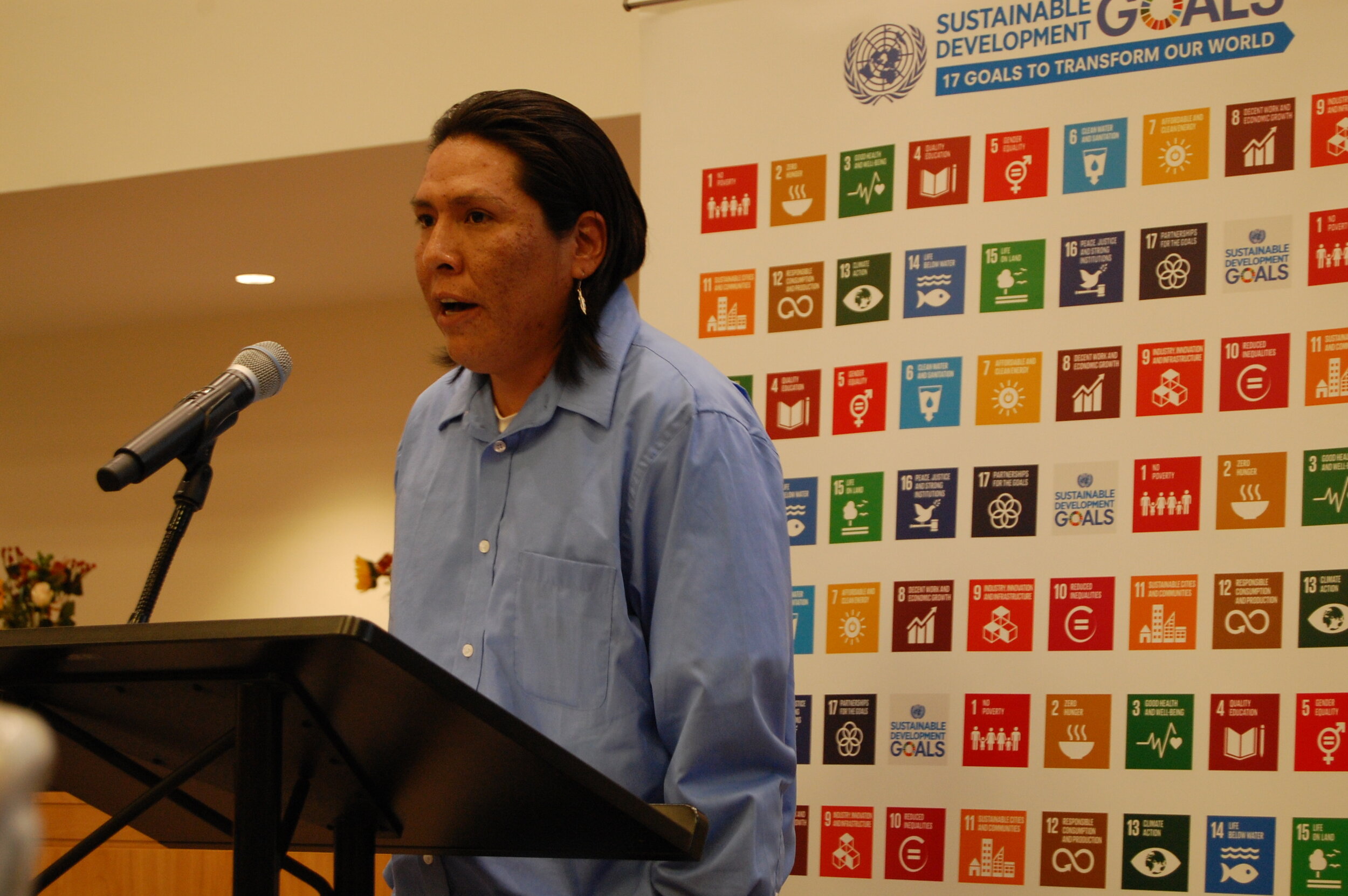
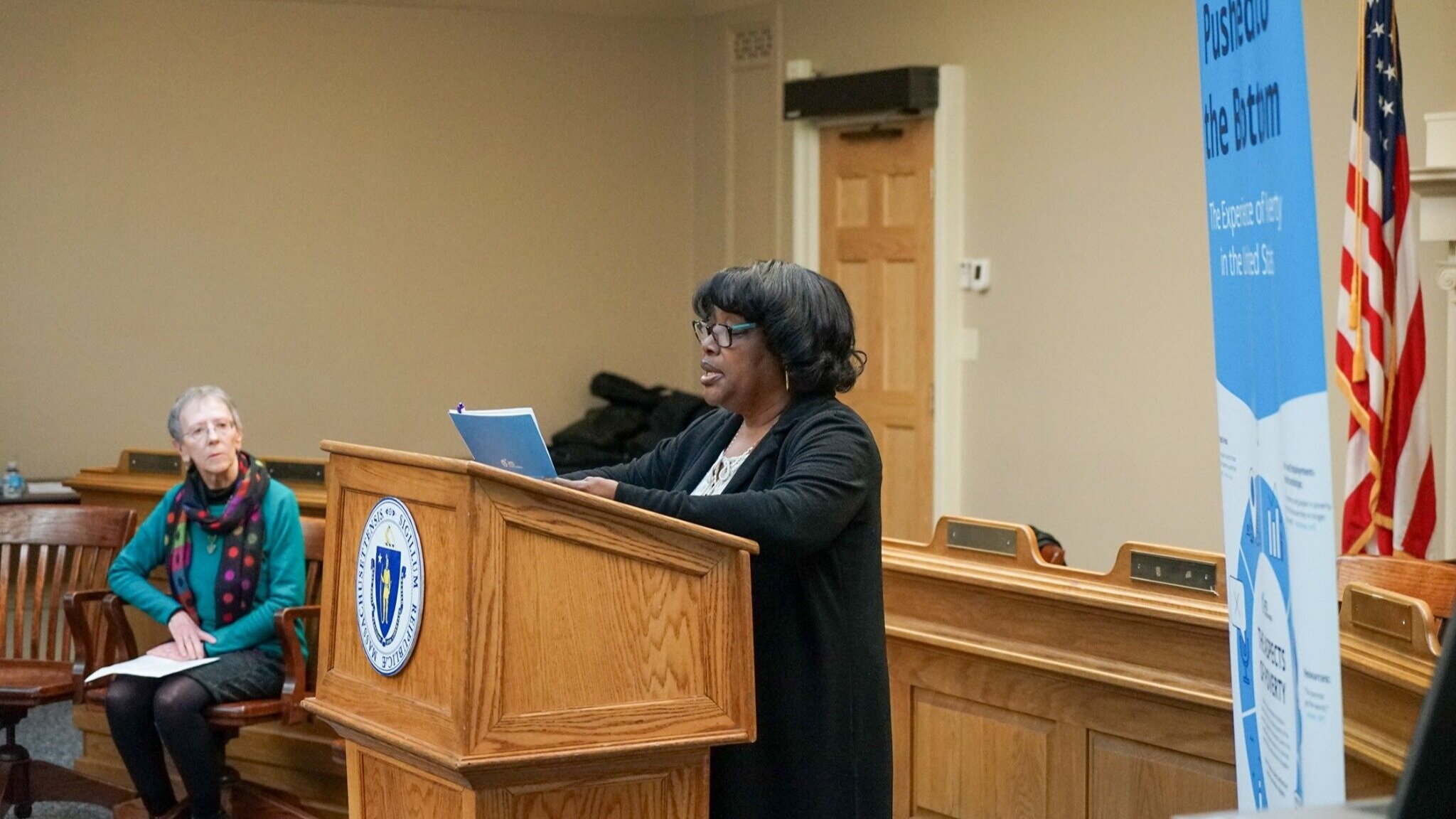
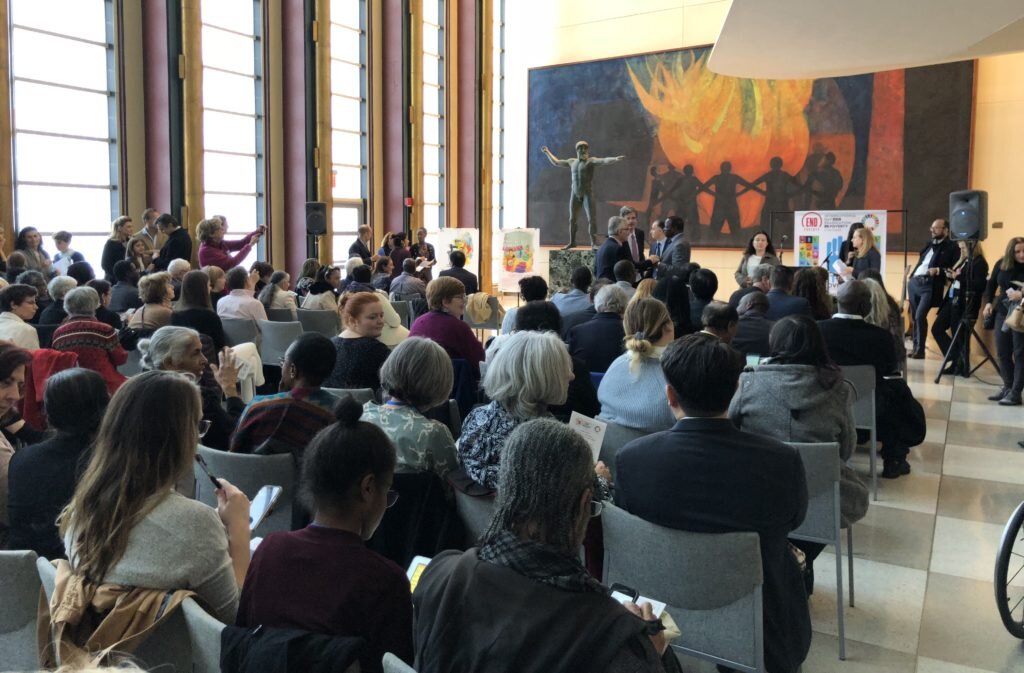
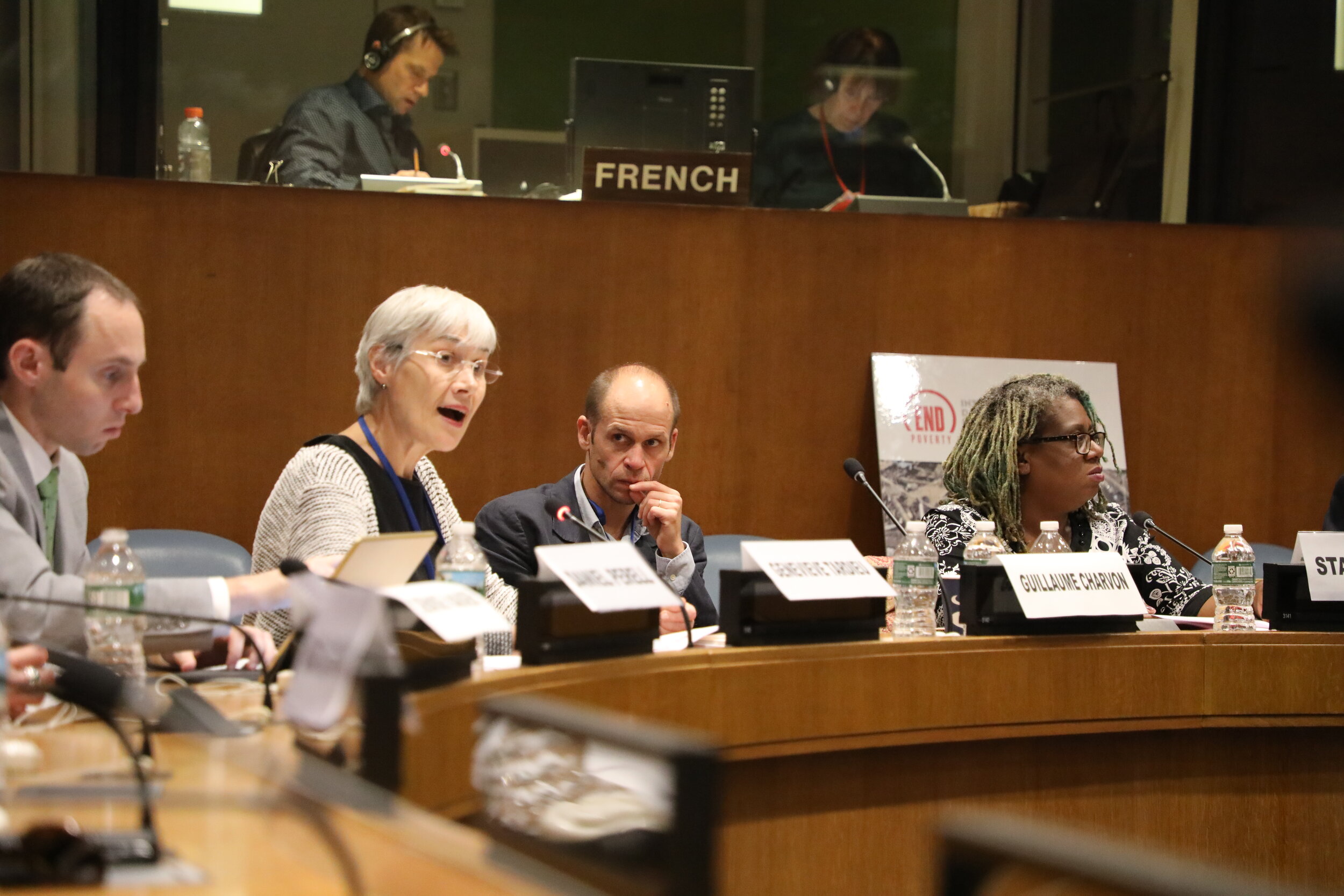
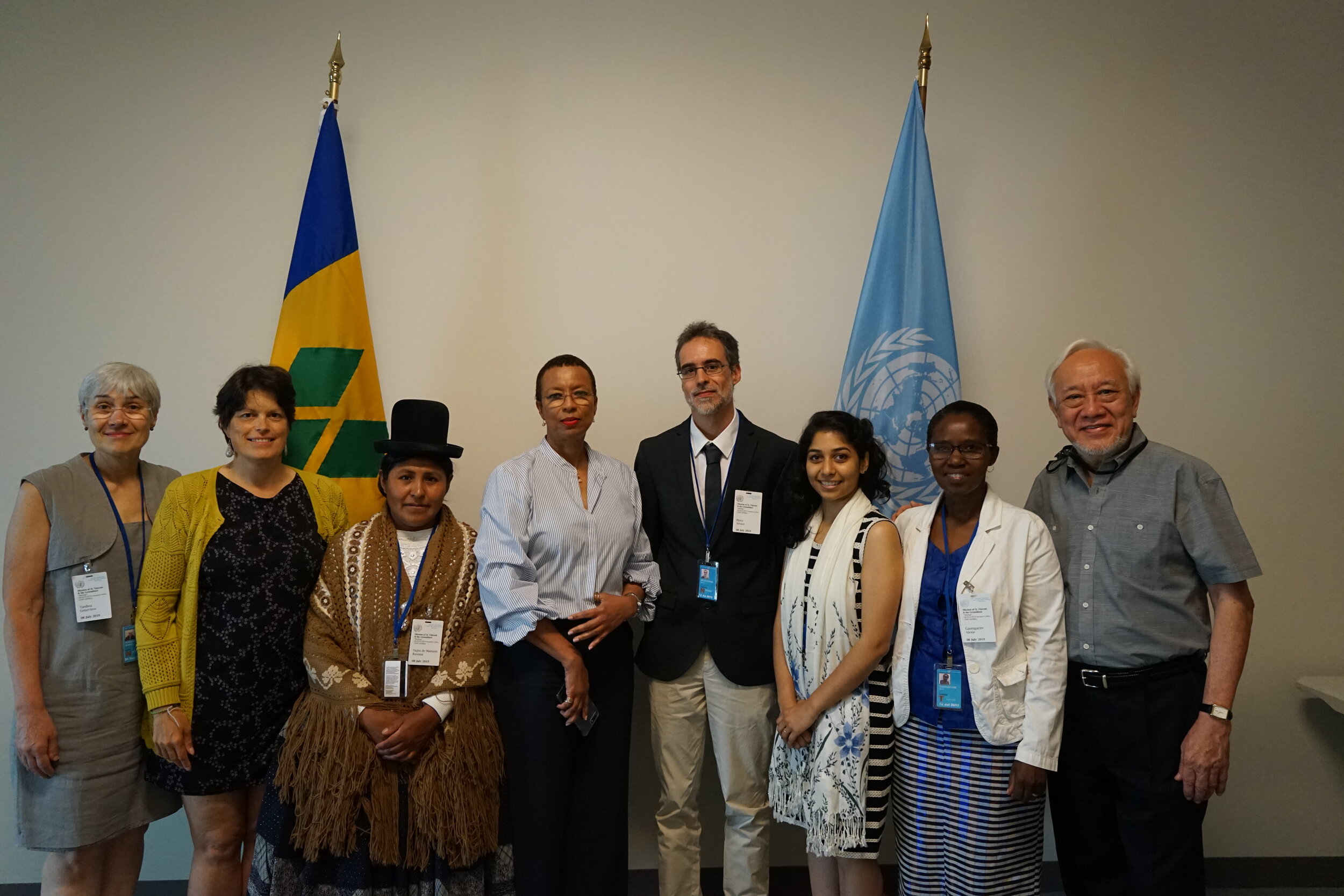
ATD Fourth World strives to have people impacted by poverty share their knowledge, experience, and concerns directly with representatives of organizations, think tanks, and institutions whose work impacts people’s lives.
In the United States, ATD Fourth World advocacy takes many forms at the international, national, state, and local levels:
As the International Movement ATD Fourth World holds general consultative status with the United Nations Economic and Social Council (ECOSOC), the ATD Fourth World team in New York City plays a particularly important role at the UN headquarters in New York City. Fourth World Activists in New York are often invited to share their knowledge and experience at the United Nations, especially during the Commission on Social Development and the High-Level Political Forum, in order to influence global discussions. The annual International Day for the Eradication of Poverty, October 17, is also a unique opportunity for their voices to be heard at the United Nations and internationally.
At the national level, the results of the research on the Multidimensional Aspects of Poverty (MAP) were presented to elected representatives on Capitol Hill. ATD Fourth World is also partnering with national think tanks to have the expertise of people with a direct experience of poverty influence their work through the MAP research.
At the city and state levels, ATD Fourth World is advocating for officials to use the findings of the MAP research as a framework to design and evaluate anti-poverty programs and policies. After a resolution was adopted in Massachusetts, several other states' houses have been approached to introduce such a bill.
ATD Fourth World uses reflective practices and outreach to form partnerships that improve interactions between local social service networks, school professionals, and people in the community who have direct experience of poverty.
ATD Fourth World Activists and their allies are also very involved in their communities to make their voices heard and have the experience and knowledge of those most impacted by social injustice be recognized and taken into account.
Phase 1: Reach out & Be present
“People living in poverty have this fear that if they open their mouths, then action will be taken against them, so nobody says anything.”
— Stacy White, ATD Fourth World Activist
+ Read more
ATD Fourth World builds bridges that connect people in a way that is key to eradicating poverty.
ATD Fourth World’s advocacy requires that a connection be established between people who have an unequal balance of power between them - often with some having decision-making power over others.
When reaching out and being present to build advocacy, ATD Fourth World strives to create the right conditions to develop an interaction that is fair and meaningful for all parties. The party with the most power does not establish the circumstances for the interaction as is usually the case. Time, place, preparation, awareness of the power dynamic during the meeting, etc., are worked on with everyone involved. The meeting is then intentionally facilitated to bring expertise from all participants to the table..
In this way, relationships are built and trust earned.
Phase 2: Build individual capacity & community
“First you come to some meetings. You don’t even know, but you’re being prepared to speak up. Your voice is being heard. As you become more comfortable with your voice being heard, you start to feel more important, start to feel more “all together in dignity.” That’s how I came to speak at the United Nations.”
— Emma Speaks, ATD Fourth World Activist
+ Read more
Through participation in projects like the Fourth World People’s University or gatherings like the International Day for the Eradication of Poverty, people living in poverty can move from shame and isolation to holding, sharing, and contributing to a collective knowledge. This knowledge fuels ATD Fourth World’s message, and the process of building it together develops a strong sense of agency and purpose.
This collective knowledge, built and shared by people with first-hand experience, is of interest to decision-makers in the fields of social services and social policy. Some agree to listen to what people have to say and be challenged by it. By being introduced to the knowledge built from the experience of the most impacted people and involved in this way, social service providers and policy makers gain new knowledge and new perspectives on their work.
Concrete experiences of people with very different stakes in an issue meeting together shows that direct participation is key in all aspects of poverty eradication and that it requires people in poverty and decision makers to learn together how to collaborate better for the community.
Phase 3: Change the narrative
“At the annual meeting of the Global Coalition to End Child Poverty, David Stewart, Chief of Child Poverty and Social Protection at UNICEF, shared how inspired the Coalition was by ATD Fourth World’s constant drive to bring the voices and experiences of vulnerable children and families.”
— Monica Jahangir-Chowdhury, ATD Fourth World Representative to the United Nations
+ Read more
Participation through advocacy has a direct impact on the narrative on poverty. Making sure that people experiencing poverty are at the table changes the framework and perspective of a meeting as well as the language that is used. Part of ATD Fourth World’s work is to develop the use of language that empowers people impacted by poverty and to encourage its use by decision makers.
For example, the word “resilience” is seen as a positive and is often used in describing underserved populations and communities, but the Fourth World Activists in the MAP research rejected it. They believe it perpetuates the idea that a “resilient” person is immune to trauma, pain, and abuse. If so immune, both systems and people can do whatever they want because a “resilient” person will bounce back. Not bouncing back is then one’s own fault due to lack of capacity, effort, or morals. “Resilience” also doesn’t recognize, as one Activist said, that “we suffer in silence.”
As another example, when discussing intergenerational poverty, the term “transmission of poverty” can carry the connotation that parents are guilty of retransmitting the poverty that they themselves inherited. The term “persistence of poverty,” on the other hand, implies many other levels of responsibility and ATD Fourth World is encouraging its use at the United Nations and elsewhere.
Phase 4: Grow our reach with activism
“Yesterday, I met with a delegation, ATD Fourth World, who came to attend our meeting this week. This NGO works with the poorest and the most destitute communities the world over. It helps them to improve their lives but also to articulate their messages to their leaders. I would like to share a message from poor communities they conveyed to me, which struck me profoundly. They said,
‘We would like others to stop making decisions for us, to stop thinking for us, to stop doing things for us, but we would like them to do things with us.’
I encouraged ATD Fourth World to make their voice heard during our meeting. However, I would like all of us to bear their message in mind as we continue our work this morning and throughout the week. We are here for the furthest behind. The success of this HLPF and the 2030 Agenda as a whole will be judged in no small part on whether we manage to empower the furthest behind to improve their lives and live in dignity.”
— Ambassador Inga Rhonda King, President of ECOSOC, opening remarks, United Nations High-Level Political Forum 2019
+ Read more
ATD Fourth World’s reach is extended every time an influential person realizes that the expertise of a person with lived experience of poverty is required for any real success in combating poverty.

